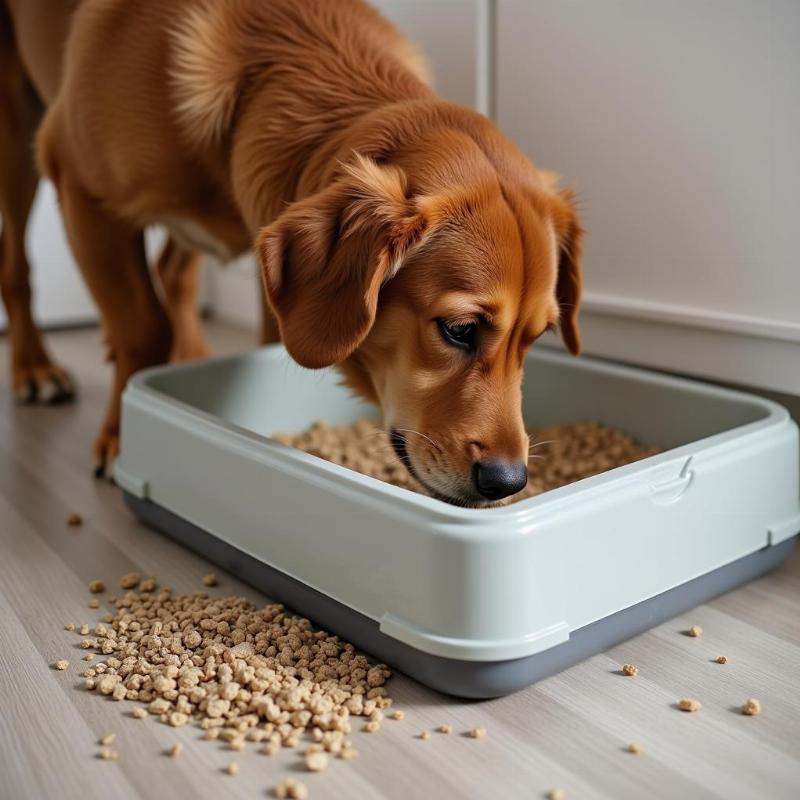If you’ve caught your dog snacking on cat litter, you’re not alone. This surprisingly common behavior, often described as “dog eating cat litter symptoms,” can range from a curious nibble to regular consumption. While it might seem harmless, it’s important to understand the potential health risks and address the underlying causes. This article will explore the reasons behind this behavior, the signs to watch for, and how to effectively stop your dog from eating cat litter.
Why is My Dog Eating Cat Litter?
Several reasons can contribute to a dog’s unusual appetite for cat litter. Medical conditions, dietary deficiencies, behavioral issues, or simply the appealing scent and texture of certain litters can all play a role. Let’s delve deeper into these potential causes.
Medical Reasons for Cat Litter Consumption
Certain medical conditions can trigger pica, a disorder characterized by the craving and consumption of non-food items. Diabetes, anemia, and thyroid problems can sometimes manifest as pica. If your dog suddenly starts eating cat litter, a visit to the veterinarian is crucial to rule out any underlying medical issues.
Dietary Deficiencies
Sometimes, a dog’s craving for cat litter can indicate a nutritional deficiency. This can be especially true with clay-based litters, which can contain minerals that attract dogs. Ensure your dog is on a balanced, high-quality diet formulated for their age and breed.
Behavioral Issues
Boredom, stress, or anxiety can also lead to unusual behaviors like eating cat litter. Providing adequate mental and physical stimulation, such as interactive toys, regular exercise, and training, can help alleviate these issues.
The Allure of Cat Litter
Some litters, especially those made with scented or clumping clay, can be strangely appealing to dogs. The texture and smell can be enticing, particularly for puppies or dogs prone to chewing.
 Dog Eating Cat Litter Symptoms
Dog Eating Cat Litter Symptoms
Recognizing the Symptoms of Cat Litter Consumption
While the most obvious symptom is catching your dog in the act, other signs can indicate they’ve been indulging in cat litter. These include vomiting, diarrhea, constipation, loss of appetite, and lethargy. If you notice any of these symptoms, consult your vet immediately.
Gastrointestinal Issues
The most common symptoms are related to the digestive system. Cat litter isn’t digestible and can cause blockages, especially the clumping variety. Watch for signs of discomfort, such as straining to defecate or abdominal pain.
Changes in Behavior
A sudden change in your dog’s behavior, such as increased thirst or lethargy, can also indicate a problem. These changes, coupled with gastrointestinal issues, can signal that cat litter consumption is the culprit.
Preventing Your Dog from Eating Cat Litter
Addressing this behavior requires a multi-faceted approach. Here are some effective strategies:
-
Restrict Access: The most straightforward solution is to prevent access to the litter box. Place the litter box in a location your dog can’t reach, such as a closed-off room, a high shelf, or behind a baby gate.
-
Covered Litter Boxes: Using a covered litter box can deter many dogs, while still allowing your cat easy access.
-
Change Litter Type: Switching to a less palatable litter, such as one made from paper, wood, or wheat, can make it less appealing to your dog.
-
Dietary Adjustments: Ensure your dog is receiving a complete and balanced diet. Consult your veterinarian to rule out any nutritional deficiencies and discuss appropriate supplements if needed.
-
Behavioral Modification: If boredom or anxiety are contributing factors, increase your dog’s mental and physical stimulation. Provide plenty of exercise, interactive toys, and training opportunities.
-
Positive Reinforcement: Reward your dog when they avoid the litter box. Use positive reinforcement techniques to encourage desired behaviors.
Conclusion
Addressing your dog’s cat litter consumption is vital for their health and well-being. By understanding the potential causes and implementing the strategies outlined above, you can effectively discourage this behavior and ensure your furry friend stays safe and healthy. Remember, if the behavior persists or you notice any concerning symptoms, consult your veterinarian for further guidance.
FAQ
- Is cat litter toxic to dogs? While small amounts might not cause serious harm, larger quantities can lead to intestinal blockages, especially with clumping litter. Ingestion can also transmit parasites.
- What if my dog keeps eating cat litter even after I’ve tried everything? Consult your veterinarian. They can help rule out any underlying medical conditions and suggest additional behavioral modification techniques.
- Can changing my dog’s food help? Yes, a balanced diet can address potential nutritional deficiencies that might contribute to this behavior.
- Are covered litter boxes effective? Often, yes. They make it more difficult for dogs to access the litter.
- Should I punish my dog for eating cat litter? No, punishment is rarely effective and can worsen anxiety. Focus on positive reinforcement and prevention strategies.
- Can a dog get sick from eating cat litter? Yes, they can experience gastrointestinal upset, blockages, and potential parasite transmission.
- What’s the best way to clean up cat litter if my dog has made a mess? Use a pet-safe cleaner and disinfectant to thoroughly clean the area.
Related Articles
- dog fetus development stages pictures
- why does my dog burrow his head into me
- found a dead tick on my dog
- dog heartworm flea and tick control
Beautdogs.us is your premier online resource for comprehensive dog care information, breed-specific guidance, and carefully curated product recommendations. Whether you’re a seasoned dog owner or just starting your journey, Beautdogs.us provides expert advice and valuable insights to help you navigate the world of dog ownership with confidence. We offer a wealth of resources on dog health, nutrition, training, and more, empowering you to provide the best possible care for your beloved canine companion. Contact us for personalized support at [email protected] or call us at +1 501-555-7529. Visit Beautdogs.us today for all your dog care needs.